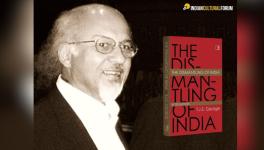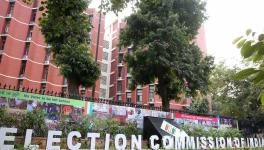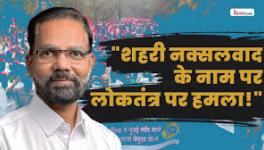Attrition of Democracy
Speaking on the 'Attrition of Democracy' in a panel discussion on 'Idea of India: A People's Agenda' organised by the Centre for Policy Analysis, Prabhat Patnaik says that the authentic form of democracy means that people as a collectivity of citizens can actually intervene politically to shape their own destinies. He says that under the neo-liberal regime, it is the economics that governs politics and this limits democracy; whereas for a democratic state, it should be politics governing the economics
Transcription:
When we say the Idea of India, there is one concept of India where you can think in terms of a country where there is a multiplicity of identities, multiplicity of identity groups. You have religious communities, you have different linguistic communities, castes and so on, living peacefully living in harmony and that is India. India as a co-existence of a multiplicity of different identity groups who exist coexist peacefully and that as an idea to be celebrated.
There is an organic idea of India and that actually says that we visualize an idea of India in which people have transcended their specific identities and have come together to constitute an alternative collectivity of citizens, collectivity of a fraternity of citizens. Now that idea of India is one, which of course does not say that identities of other kinds gets obliterated, but that there is an overarching identity, that is an overarching formation of a fraternity of equal citizens that transcends individual identities.
I believe that the distinction between these two ideas is something which afflicts the concept of democracy – whether democracy is to be seen in terms of representation of different groups, accommodation of different identity groups -- lets say arrangements whereby they can coexist because of negotiations between them. That is one notion of democracy.
The alternative notion of democracy is the formation of a collectivity of citizens who as a fraternity of equals can intervene politically to shape their own lives and shape their own destinies.
I believe that latter is the authentic the concept of democracy because in the former concept of democracy, negotiations and accommodations between different religious communities or between different linguistic communities, start with tolerance of the pre-existing inequalities in society. What is more there is no equilibrium and over a period of time, the equilibrium shifts in favour of the majority community. In each of these cases, it favours the more powerful groups. As a result if we have to actually think in terms of democracy, then we have to think in terms of the fact that the people as a collectivity of citizens can actually intervene politically to shape their own destinies.
I think this was the concept of democracy which underlay the 1931 Karachi congress. This also is the concept that actually underlies, in essence, the constitution when it talks about “We, the People of India”. The people of India constitute as it were a collectivity that transcends the individual identities – that it would constitute the formation of a new collective identity. Now, I believe that not only is there this distinction, not only is the a case that any authentic notion of democracy must mean that the people who collectively constitute a group that can intervene meaningfully , through politics, to shape their own lives and destinies. But if one does not do so, the danger is that you would slide into the other concept of democracy in terms of their accommodations – in terms of negotiation and so on which essentially then ultimately means the continuation of an unequal society and of course over a period of time the strengthening of the more powerful, the strengthening of the majority view, of a majoritarian tendency.
Now I think in order to have this authentic notion of democracy which was as it were what underlay my view that the implicit social contract that was formed in 1931 at the Karachi Congress on the basis of which the independence struggle took off in a big way. In order to realize that notion of democracy, certain minimum conditions must be fulfilled. The first condition of course is that everybody must have a certain minimum level of living in terms of education, in terms of health, in terms of nutrition, in terms of a minimum material standard of life without which you cannot have the kind of subjectivity - collective subjectivity of the people that is essential for a democracy. The second thing is that you must have a degree of egalitarianism. Again otherwise that subverts that notion of a collective subject that the people can constitute. And the third which is not often realized, is the fact that if democracy is supposed to be mean anything -- if it means that people can collectively politically affect their own lives -- in that case “Politics must matter”. For Politics to matter it is important therefore that politics must govern economics. Now, fundamentally in my view, that is not what happens under capitalism. In a capitalist society which is fundamentally, if you like, a spontaneous economy. Capitalism is driven by a whole lot of inner tendencies. Nobody wants a crisis in a capitalist economy but crisis happen. They happen not because anyone wills it to happen, but because it is spontaneous. It is a self- driven system in which things happen independent of people's will and consciousness.
Now if that is the case then in such a society intervention in the political manner through, for instance, the state in the functioning of the economy, has inherent limitations. The biggest intellectual challenge to this in the 20th century was posed by John Maynard Keynes who as you know argued that a capitalist economy left to its own devices generates unemployment. People are not going to tolerate it and as a result it is very important to have an intervention by an agency that, in his liberal conception, was an embodiment of social rationality namely the State and as a result, through politics, you would be able to rectify the errors of the system. The collapse of Keynesianism is, in a sense, proof of the fact that the spontaneity of capitalism as an economic system wins over in the long run. This is because any political intervention in its functioning produces a kind of dysfunction where either you carry the political intervention further and further in order to overcome the system itself or alternatively, if you want to retain the system, you move back on your political intervention so that the spontaneity of the system asserts itself.
Now this as a phenomenon, is of course general. But in today’s world, the fact that politics is something whose capacity to make a difference to the functioning of the economy is greatly attenuated. This arises from the times we live in. The times we live in are characterized on the one hand by the existence of nation-states. When people elect they elect a government of India. On the other hand if you have the country which is part of the flow of global finance, the flow of global capital, the capacity of the nation state to intervene in the movements of globalized capital, once it's open to the process of globalization, is minimal. As a result in order to prevent capital from flowing out in vast magnitude, you have to make sure that the global investors are happy with your economy -- that global capital finds you a hospitable space to which it can then be attracted-- where it can dwell. If anything happens through political intervention that goes against the predilections of globalized finance then of course finance leaves and the state is forced to cut back on its intervention. So today above all, when we are living in a world of globalization in which the capacity of the people to intervene politically is at best, at its very best limited to the terrain of a nation state, you actually have, in very fundamental sense, an attenuation, and in a very very fundamental sense a restriction of democracy -- because after all you have a restriction of politics.
And if that is the case, then necessarily what you find is that the other requirements, which I said, are essential for realizing the notion of democracy, where people as a collectivity intervene politically to shape their own destinies – all those get subverted, get undermined. The minimum standards of living which are essential for making a fraternity of citizens, are in fact increasingly denied. In fact someone referred to the poverty debate- if anything you find that, in terms of nutrition there has been without any doubt a worsening in the living conditions of larger and larger proportion of this country's population. Likewise inequalities increase dramatically. All that is required in order to produce march towards the meaning for democracy ( democracy is not something that you achieved like that, even for progress towards democracy), all that are the preconditions for that, are being subverted in the current specific type of economic regime in which we live.
As a result what is happening is that the other portion of democracy comes to the fore. What we have as a matter of fact therefore is a situation where the State on the one hand has to cow-tow to the caprices of globalized finance, globalized capital, and on the other hand you have a plethora of identity politics. There is no contradiction between these because the state cow-towing to the caprices of globalized capital really amounts to the fact that
the people who politically are supposed to assert their subject role in fact are reduced to the role of objects. But of course this objecthood is not overcome by identity politics because the essence of identity politics is that as objects there is competition for a few crumbs that actually falling from the table. So essentially, you have a combination on the one hand of the objecthood of people, a denial in a very fundamental sense of the space for democracy because of the kind of economic regime that we are in particular the economic regime of globalization that has ushered in neoliberal capitalism and on the other hand that has given rise to a good kind of identity politics where the collectivity of the people, their capacity to intervene itself ,is subverted, and the two in a sense go in tandem.
But a part of the logic of the development, is also that it is prone to crisis and what we are witnessing today is a global crisis and its manifestations in the Indian context as well. The manifestation in the Indian context, takes the form, as was referred to earlier, of the fact that we have a combination of tendency towards stagnation, massive slowing down of the growth rare that was taking place earlier. A combination of that together with inflation, together with a decline in the value of the rupee -- all of which impinge very badly on the living conditions of the people, because we have an inflationary crisis. In fact the conditions for these inflationary crisis is the worsening living condition – To explain, suppose it was the case that the people were not to hit by inflation where suppose you had the case where you had wage indexed to prices, then prices would rise to infinity. The fact that you actually have inflation going on and on and on is predicated on the fact that some people were continuously suffering because of it. If they did not suffer that then there would be no inflation, then prices would have inflated to infinity.
So you have necessarily a squeeze on the living conditions of the people through inflation through heightened unemployment. Even in the period of high growth we know that on the one hand there was a massive process of primitive accumulation of capital, in the sense of dispossessing petty producers, peasants and so on where it was no longer profitable for them to operate. Quite often they actually were evicted from the land that they were operating, without at the same time a creation of a decent employment that capitalism traditionally promises to create. As a result we have an enormous swelling of informal sector unemployment part-time employment, casual employment and all the rest of it ---all of which entails a swelling of the poverty-stricken population. But what is more now -- even the generation of that employment is going to be further hit and therefore you have further crisis. So a combination of inflation, unemployment is something which is going affect the people very sharply.
And this at the same time therefore provides the context in which a change can be thought of. Obviously, the preservation of any democratic institutions require in this context a change in the kind of trajectory of development of the country. Not surprisingly this is also the context in which a serious effort is being made for a corporate control over the state through the medium of an individual who has been projected in the media as the next prime minister and that to my mind is an effort towards direct corporate control over the state with his dad which is a symptom of fascism. Now essentially therefore at this particular point, the chances of launching a struggle for recapturing, as it were, the trajectory of movement towards democracy are certainly existent. But we have to be careful that any such attempt also mean a change in the nature of the economic regime. If you are, as it were, caught in the vortex globalized finance movements then the essence of popular sovereignty where people can affect their own lives through political intervention is something which is subverted. If you want to recapture the latter then you necessarily have to create the space where the state has a degree of autonomy because of which political intervention by people can use the State so that a better India can be built. Thank you.
Get the latest reports & analysis with people's perspective on Protests, movements & deep analytical videos, discussions of the current affairs in your Telegram app. Subscribe to NewsClick's Telegram channel & get Real-Time updates on stories, as they get published on our website.
























